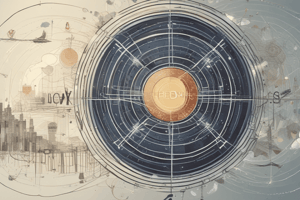Podcast
Questions and Answers
Match the following terms with their definitions:
Match the following terms with their definitions:
Scarcity = The condition that results from society not having enough resources to produce all the things people would like to have Economist = A person who studies how people satisfy unlimited and competing wants with the careful use of scarce resources Resources = The things that people use to make goods or services Goods = Physical items that are produced or sold
Match the following terms with their definitions:
Match the following terms with their definitions:
Land = The amount of money/factories available to you for your production Labor = The population that is able to work on that specific item, limited by the number of citizens able to work within a given field Capital = Natural resources that are needed to produce Entrepreneur = The people who start new businesses or bring new products to the market by working with the resources of land capital and labor
Match the following economic systems with their characteristics:
Match the following economic systems with their characteristics:
Market Economy = centrally operated by the government Command Economy = economic systems in which supply, demand, and the price system help people make decisions and allocate resources Closed Economy = based on traditions or customs of a family or community Traditional Economy = restrict trade with international partners
Match the following terms with their definitions:
Match the following terms with their definitions:
Match the following terms with their definitions:
Match the following terms with their definitions:
Match the following terms with their definitions:
Match the following terms with their definitions:
Match the following economic systems with their characteristics:
Match the following economic systems with their characteristics:
Match the following terms with their definitions:
Match the following terms with their definitions:
Match the following terms with their definitions:
Match the following terms with their definitions:
Match the following terms with their definitions:
Match the following terms with their definitions:
Flashcards are hidden until you start studying
Study Notes
Economics and Resources
- Economics is the study of producing and consuming goods and services
- Goods are physical items produced or sold, while services are tasks completed by a company for payment
- Producers provide goods and services, while consumers use them
- Scarcity occurs when society lacks enough resources to produce everything people want
Types of Resources
- There are three types of resources: land, labor, and capital
- Land refers to natural resources needed for production
- Labor is the population able to work on a specific item, limited by the number of citizens able to work in a given field
- Capital is the money and factories available for production, limited by an economy's monetary and physical resources
- Entrepreneurship is the people who start new businesses or bring new products to the market using land, capital, and labor
Economic Systems
- Market Economy: supply, demand, and the price system help people make decisions and allocate resources
- Command Economy: centrally operated by the government
- Closed Economy: restricts trade with international partners
- Traditional Economy: based on traditions or customs of a family or community
Supply and Demand
- Supply is the amount of a good or service available in a market at a given price
- Demand is the desire, ability, and willingness to buy a product
Studying That Suits You
Use AI to generate personalized quizzes and flashcards to suit your learning preferences.




